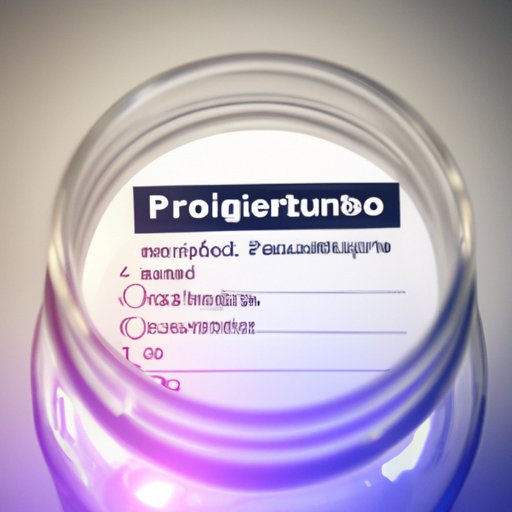
Introduction
Probiotics are live microorganisms that can provide health benefits when consumed in adequate amounts. One of the most well-known benefits of probiotics is that they can improve gut health by restoring the natural balance of bacteria in the digestive tract. However, to reap the maximum benefits of probiotics, it is important to take them at the right time and in the right way.
The Basics of Probiotics: When to Take These Beneficial Bacteria
Probiotics are available in many forms, including capsules, powders, and foods such as yogurt and kefir. They work by colonizing the gut and competing with harmful bacteria for nutrients and space. In order to ensure that probiotics are effective, it is important to choose the right strain and take them at the recommended frequency.
The recommended frequency of intake can vary based on age, health status, and dietary habits. For example, children may need to take probiotics more frequently than adults, and people with certain health conditions may benefit from higher doses. It is important to follow the recommended intake frequency and dosage to avoid side effects such as bloating and diarrhea.
Boosting Gut Health with Probiotics: A Guide to Timing Your Doses
The timing of probiotic intake can have a significant impact on their effectiveness. Taking probiotics at the wrong time can result in fewer benefits or even negative side effects.
One of the best times to take probiotics is before meals. This allows the probiotics to colonize the gut more effectively, as food can interfere with their ability to survive and thrive. Another option is to take probiotics at certain times of the day, such as in the morning or before bedtime.
When incorporating probiotics into your daily routine, it is important to choose a consistent time and stick to it to ensure maximum effectiveness.
The Benefits of Taking Probiotics Before or After Meals
One common debate among probiotic users is whether it is best to take probiotics before or after meals. The answer varies depending on the individual and their specific needs.
Taking probiotics with food can be beneficial for some people, as food can help protect probiotics from stomach acid. This can increase their overall survival rate in the digestive tract, making them more effective. However, taking probiotics on an empty stomach can lead to faster absorption and potentially faster benefits.
The best approach is to experiment with both methods and pay attention to your body’s response to determine which works best for you.
Understanding the Importance of Probiotic Strains to Determine When to Take Them
Not all probiotics are created equal. Different strains can have different benefits and require different dosages and timing. Some of the most common probiotic strains include Lactobacillus, Bifidobacterium, and Saccharomyces boulardii.
Lactobacillus is one of the most well-known and widely used probiotic strains. It is commonly found in the digestive tract and has been shown to help improve digestion and boost the immune system. Bifidobacterium is another popular strain that has been found to be effective in treating conditions such as irritable bowel syndrome (IBS) and ulcerative colitis. Saccharomyces boulardii is a yeast strain that can help reduce antibiotic-associated diarrhea and treat other digestive issues.
When choosing a probiotic, it is important to consider your individual needs and choose a product that contains the strains that are best suited to your condition.
Factors to Consider When Choosing the Best Time to Take Probiotics
In addition to strain and dosage, there are other factors to consider when determining the best time to take probiotics. For example, certain medications can interfere with probiotic absorption and effectiveness. Antibiotics, in particular, can significantly disrupt the balance of healthy bacteria in the gut.
Travel and stress levels can also affect the timing and dosage of probiotics. For example, if you are traveling to an area with poor sanitation, you may need to take a higher dose of probiotics to help prevent illness.
Nighttime or Daytime Probiotics: Which Works Best for You?
Another question many probiotic users ask is whether it is better to take them before bedtime or during the day. Some studies have found that taking probiotics before bed can improve sleep quality, while others have found no significant difference between daytime and nighttime intake.
Ultimately, the best approach is to pay attention to your body’s response to probiotics and adjust your intake accordingly. Some people may find that taking probiotics before bed helps them sleep better, while others may prefer to take them in the morning or during the day.

Incorporating Probiotics into Your Daily Routine: When to Take Them and Maximum Benefits
Incorporating probiotics into your daily routine can be a simple and effective way to improve gut health and overall well-being. To get the most out of probiotics, it is important to choose a high-quality product that contains the strains you need and to take them at the recommended frequency and dosage.
Other tips for incorporating probiotics into your daily routine include tracking your intake, choosing a consistent time to take them, and adjusting your intake based on factors such as medication use and travel.
Conclusion
Probiotics can offer a wide range of benefits for gut health, but proper timing and dosing are crucial to their effectiveness. By choosing the right strain, following the recommended frequency and dosage, and considering other factors that may affect timing, you can maximize the benefits of probiotics for your individual needs. As always, it is important to consult with your healthcare provider before starting a new probiotic regimen.




